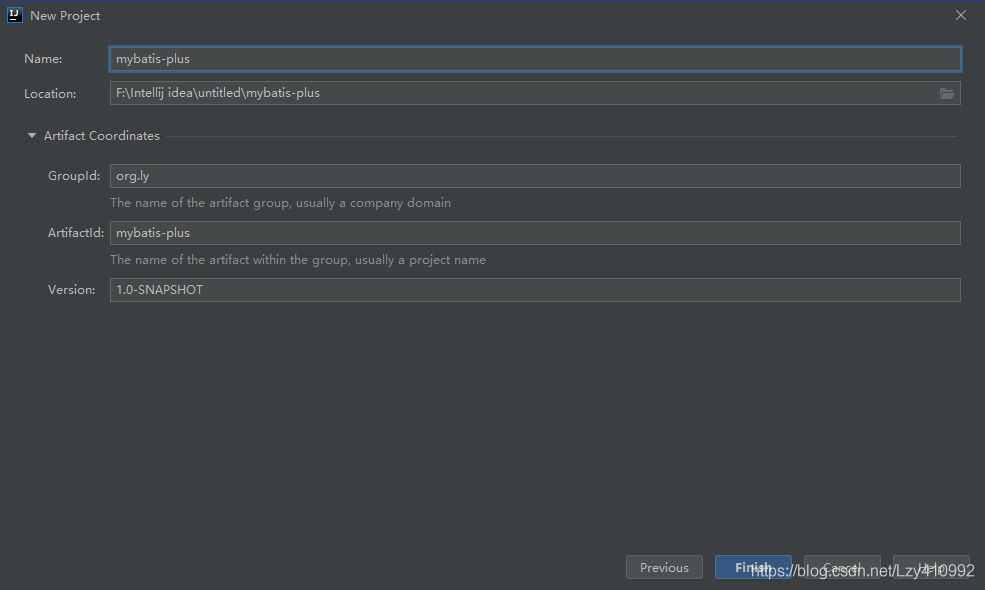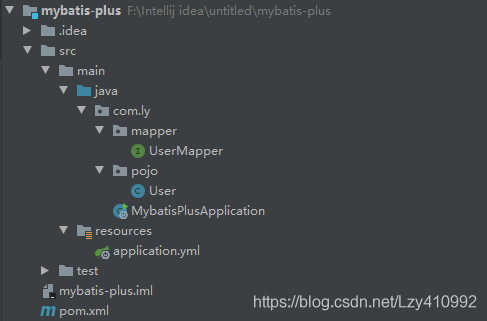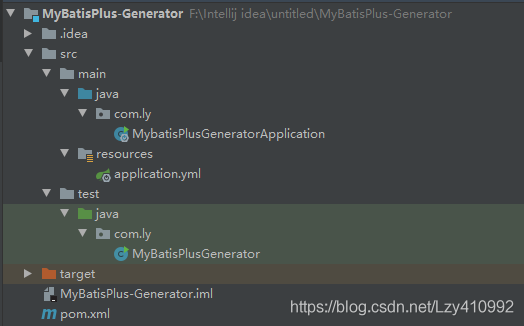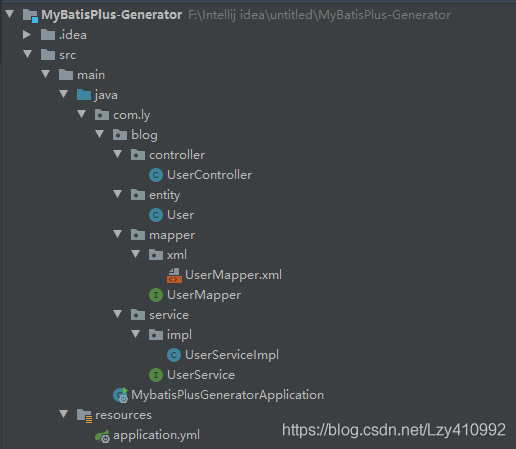Mybatis-Plus学习总结(建议收藏)
点击上方[全栈开发者社区]→右上角[...]→[设为星标⭐]
点击领取全栈资料:全栈资料
MyBatis-Plus(简称 MP)是一个 MyBatis 的增强工具,在 MyBatis 的基础上只做增强不做改变,为简化开发、提高效率而生。
基本特性
无侵入:只做增强不做改变,引入它不会对现有工程产生影响,如丝般顺滑
损耗小:启动即会自动注入基本 CURD,性能基本无损耗,直接面向对象操作
强大的 CRUD 操作:内置通用 Mapper、通用 Service,仅仅通过少量配置即可实现单表大部分 CRUD 操作,更有强大的条件构造器,满足各类使用需求
支持 Lambda 形式调用:通过 Lambda 表达式,方便的编写各类查询条件,无需再担心字段写错
支持主键自动生成:支持多达 4 种主键策略(内含分布式唯一 ID 生成器 - Sequence),可自由配置,完美解决主键问题
支持 ActiveRecord 模式:支持 ActiveRecord 形式调用,实体类只需继承 Model 类即可进行强大的 CRUD 操作
支持自定义全局通用操作:支持全局通用方法注入( Write once, use anywhere )
内置代码生成器:采用代码或者 Maven 插件可快速生成 Mapper 、 Model 、 Service 、 Controller 层代码,支持模板引擎,更有超多自定义配置等您来使用
内置分页插件:基于 MyBatis 物理分页,开发者无需关心具体操作,配置好插件之后,写分页等同于普通 List 查询
分页插件支持多种数据库:支持 MySQL、MariaDB、Oracle、DB2、H2、HSQL、SQLite、Postgre、SQLServer 等多种数据库
内置性能分析插件:可输出 Sql 语句以及其执行时间,建议开发测试时启用该功能,能快速揪出慢查询
内置全局拦截插件:提供全表 delete 、 update 操作智能分析阻断,也可自定义拦截规则,预防误操作
快速入门
1、创建数据库 mybatis_plus
现有一张 User 表,其表结构如下:

其对应的数据库 Schema 脚本,数据库 Data 脚本如下:
DROP TABLE IF EXISTS user;
CREATE TABLE user
(
id BIGINT(20) NOT NULL COMMENT '主键ID',
name VARCHAR(30) NULL DEFAULT NULL COMMENT '姓名',
age INT(11) NULL DEFAULT NULL COMMENT '年龄',
email VARCHAR(50) NULL DEFAULT NULL COMMENT '邮箱',
PRIMARY KEY (id)
);
-- 真实开发中,version(乐观锁),deleted(逻辑删除)、gmt_create、gem_mo
DELETE FROM user;
INSERT INTO user (id, name, age, email) VALUES
(1, 'Jone', 18, 'test1@baomidou.com'),
(2, 'Jack', 20, 'test2@baomidou.com'),
(3, 'Tom', 28, 'test3@baomidou.com'),
(4, 'Sandy', 21, 'test4@baomidou.com'),
(5, 'Billie', 24, 'test5@baomidou.com');
2、新建Maven工程

导入相关依赖
<?xml version="1.0" encoding="UTF-8"?>
<project xmlns="http://maven.apache.org/POM/4.0.0"
xmlns:xsi="http://www.w3.org/2001/XMLSchema-instance"
xsi:schemaLocation="http://maven.apache.org/POM/4.0.0 http://maven.apache.org/xsd/maven-4.0.0.xsd">
<modelVersion>4.0.0</modelVersion>
<parent>
<groupId>org.springframework.boot</groupId>
<artifactId>spring-boot-starter-parent</artifactId>
<version>2.3.4.RELEASE</version>
<relativePath/> <!-- lookup parent from repository -->
</parent>
<groupId>com.ly</groupId>
<artifactId>mybatis-plus</artifactId>
<version>1.0-SNAPSHOT</version>
<name>mybatis-plus</name>
<description>Demo project for Spring Boot</description>
<properties>
<project.build.sourceEncoding>UTF-8</project.build.sourceEncoding>
<project.reporting.outputEncoding>UTF-8</project.reporting.outputEncoding>
<java.version>1.8</java.version>
</properties>
<dependencies>
<!--mybatis-plus 是自己开发的,非官方的!-->
<dependency>
<groupId>com.baomidou</groupId>
<artifactId>mybatis-plus-boot-starter</artifactId>
<version>3.3.1.tmp</version>
</dependency>
<dependency>
<groupId>org.springframework.boot</groupId>
<artifactId>spring-boot-starter-web</artifactId>
</dependency>
<dependency>
<groupId>mysql</groupId>
<artifactId>mysql-connector-java</artifactId>
<scope>runtime</scope>
</dependency>
<dependency>
<groupId>org.projectlombok</groupId>
<artifactId>lombok</artifactId>
</dependency>
<dependency>
<groupId>org.springframework.boot</groupId>
<artifactId>spring-boot-starter-test</artifactId>
<scope>test</scope>
<exclusions>
<exclusion>
<groupId>org.junit.vintage</groupId>
<artifactId>junit-vintage-engine</artifactId>
</exclusion>
</exclusions>
</dependency>
</dependencies>
<build>
<plugins>
<plugin>
<groupId>org.springframework.boot</groupId>
<artifactId>spring-boot-maven-plugin</artifactId>
</plugin>
</plugins>
</build>
</project>
说明:我们使用mybatis-plus可以节省我们大量的代码,尽量不要同时导入mybatis和mybatis-plus!版本的差异!
3、配置文件application.yml
spring:
#配置数据源
datasource:
driver-class-name: com.mysql.cj.jdbc.Driver
url: jdbc:mysql://localhost:3306/mybatis_plus?useSSL=false&serverTimezone=GMT%2B8&useUnicode=true&characterEncoding=utf-8
username: root
password: 123456
#配置日志,我们所用的sql现在是不可见的,我们希望知道他是怎么执行的,所以我们必须要查看日志!
mybatis-plus:
configuration:
log-impl: org.apache.ibatis.logging.stdout.StdOutImpl
4、编写代码
mybatis-plus的使用步骤:引入依赖 -> 创建pojo -> 实现dao接口(不用写mapper.xml文件,只需要在启动器上配置 mapper 扫描路径即可)-> 基本使用
编写实体类 User.java,这里使用了Lombok插件
@Data
@AllArgsConstructor
@NoArgsConstructor
public class User {
private Long id;
private String name;
private Integer age;
private String email;
}
编写Mapper类 UserMapper.java
//在对应的Mapper上继承基本的类baseMapper
public interface UserMapper extends BaseMapper<User> {
//所有的CRUD已经编写完成
//不需要像以前的配置一些xml
}
新建 Spring Boot 启动类中添加 @MapperScan 注解,扫描 Mapper 文件夹:
@SpringBootApplication
@MapperScan("com.ly.mapper")//扫描mapper文件夹
public class MybatisPlusApplication {
public static void main(String[] args) {
SpringApplication.run(MybatisPlusApplication.class, args);
}
}
工程目录:

添加测试类,进行功能测试:
@RunWith(SpringRunner.class)
@SpringBootTest
public class MybatisPlusTest {
//继承了BaseMapper,所有方法都来自父类
//我们可以编写自己的拓展方法
@Autowired
private UserMapper userMapper;
@Test
public void testSelect() {
System.out.println(("----- selectAll method test ------"));
//参数是一个Wrapper,条件结构器,这里先不用 填null
//查询所有的用户
List<User> userList = userMapper.selectList(null);
userList.forEach(System.out::println);
}
}
UserMapper 中的 selectList() 方法的参数为 MP 内置的条件封装器 Wrapper,所以不填写就是无任何条件
控制台输出:

实现CRUD
插入操作:
插入一条记录: int insert(T entity);
插入类型T:实体对象
举例测试:
@Test
public void testInsert() {
User user = new User();
user.setName("LY");
user.setAge(100);
user.setEmail("123@qq.com");
int result = userMapper.insert(user); //帮我们生成id
System.out.println(result); //受影响的行数
System.out.println(user); //发现id会自动回填
}
运行结果:mybatis-plus实现了主键自动生成

主键生成策略:
数据库插入的id为全局默认的id(ID_WORKER),我们需要配置主键自增,在实体类字段上添加注解:@TableId(type =IdType.AUTO),数据库字段一定要是自增的。
public enum IdType {
AUTO(0), //数据可id自增
NONE(1), //未设置主键
INPUT(2), //手动输入
ID_WORKER(3), //默认的全局唯一id
UUID(4), //全局唯一id uuid
ID_WORKER_STR(5); // ID_WORKEK 字符串表示法
private int key;
private IdType(int key) {
this.key = key;
}
public int getKey() {
return this.key;
}
}
添加过注解,并将数据库id字段设置为自增后,测试插入数据:

雪花算法:
SnowFlake 算法,是 Twitter 开源的分布式 id 生成算法。其核心思想就是:使用一个 64 bit 的 long 型的数字作为全局唯一 id。在分布式系统中的应用十分广泛,且ID 引入了时间戳,基本上保持自增的。
这 64 个 bit 中,其中 1 个 bit 是不用的,然后用其中的 41 bit 作为毫秒数,用 10 bit 作为工作机器 id,12 bit 作为序列号。
更新操作
// 根据 whereEntity 条件,更新记录
int update(@Param(Constants.ENTITY) T entity, @Param(Constants.WRAPPER) Wrapper<T> updateWrapper);
// 根据 ID 修改
int updateById(@Param(Constants.ENTITY) T entity);
#参数说明
类型 参数名 描述
T entity 实体对象 (set 条件值,可为 null)
Wrapper updateWrapper 实体对象封装操作类(可以为 null,里面的 entity 用于生成 where 语句)
举例测试:
@Test
public void testUpdate() {
//sql自动动态配置
User user = new User();
user.setName=("ZZ");
user.setId(3L);
user.setAge("50");
//注意:updateById的参数是一个对象
userMapper.updateById(user);
}
运行结果:

自动填充
创建时间、修改时间!这些个操作一般都是自动化完成,我们不希望手动更新!
阿里巴巴开发手册:所有的数据库表:gmt_create\gmt_modified几乎所有的表都要配置上!而且需要自动化
方式一:数据库级别 (工作中不允许)
在表中新增字段 create_time 、update_time,设为默认CURRENT_TIMESIAMP
方式二:代码级别
在表中新增字段 create_time 、update_time:

实体类上的属性需要增加注解 @TableField
@Data
@AllArgsConstructor
@NoArgsConstructor
public class User {
@TableId(type = IdType.AUTO)
private Long id;
private String name;
private Integer age;
private String email;
//创建时间,插入数据时操作
@TableField(fill = FieldFill.INSERT)
private Date createTime;
//更新时间,插入和更新是操作
@TableField(fill = FieldFill.INSERT_UPDATE)
private Date updateTime;
}
编写处理器来处理这个注释:
@Slf4j
@Component //不要忘记吧处理器加到IOC容器中
public class MyMetaObjectHandler implements MetaObjectHandler {
//插入时候的填充策略
@Override
public void insertFill(MetaObject metaObject) {
log.info("start insert fill ...."); //日志
//设置字段的值(String fieldName字段名,Object fieldVal要传递的值,MetaObject metaObject)
this.setFieldValByName("createTime",new Date(),metaObject);
this.setFieldValByName("updateTime",new Date(),metaObject);
}
//更新时间的填充策略
@Override
public void updateFill(MetaObject metaObject) {
log.info("start update fill ....");
this.setFieldValByName("updateTime",new Date(),metaObject);
}
}
测试插入一条数据:

数据库中的数据:

乐观锁
乐观锁:顾名思义十分乐观,它总是被认为不会出现问题,无论干什么都不去上锁!如果出现了问题,再次更新测试
悲观锁:顾名思义十分悲观,它总是出现问题,无论干什么都会上锁!再去操作!
乐观锁实现方式:
取出记录时,获取当前version
更新时,带上这个version
执行更新事,set version=newVersion where version =oldVersion
如果version不对,就更新失败
乐观锁:1、先查询,获得版本号 version=1
--A
update user set name ="shuishui" ,version =version+1
where id =2 and version=1
--B 如果线程抢先完成,这个时候version=2,会导致A修改失败
update user set name ="shuishui" ,version =version+1
where id =2 and version=1
测试乐观锁:
1、表中创建乐观锁字段version 默认值为1
2、同步实体类
@Version //乐观锁Version注解
private Integer version;
3、注册组件 (config包下)
@EnableTransactionManagement
@MapperScan("com.ly.mapper")
@Configuration//配置类
public class MyBatisPlusConfig{
//注册乐观锁插件
@Bean
public OptimisticLockerInterceptor optimisticLockerInterceptor() {
return new OptimisticLockerInterceptor();
}
}
测试乐观锁成功:
//测试乐观锁成功
@Test
public void testOptimisticLocker(){
//1、查询用户信息
User user = userMapper.selectById(1L);
//2、修改用户信息
user.setName("LZY");
user.setEmail("222@qq.com");
//执行更新操作
userMapper.updateById(user);
}

模拟乐观锁失败:
//测试乐观锁失败
@Test
public void testOptimisticLocker2(){
//1、查询用户信息
User user = userMapper.selectById(1L);
//2、修改用户信息
user.setName("LZY1");
user.setEmail("111@qq.com");
//1、模拟另一个线程执行了插队操作
User user2 = userMapper.selectById(1L);
//2、修改用户信息
user2.setName("LZY2");
user2.setEmail("222@qq.com");
//执行更新操作
userMapper.updateById(user2);
//执行更新操作
userMapper.updateById(user); //如果没有乐观锁就会覆盖插队线程的值
}

查询操作
根据 ID 查询:T selectById(Serializable id);
根据 entity 条件,查询一条记录:T selectOne(@Param(Constants.WRAPPER) Wrapper queryWrapper);
查询(根据ID 批量查询):List selectBatchIds(@Param(Constants.COLLECTION) Collection<? extends Serializable> idList);
根据 entity 条件,查询全部记录:List selectList(@Param(Constants.WRAPPER) Wrapper queryWrapper);
查询(根据 columnMap 条件):List selectByMap(@Param(Constants.COLUMN_MAP) Map<String, Object> columnMap);
根据 Wrapper 条件,查询全部记录:List<Map<String, Object>> selectMaps(@Param(Constants.WRAPPER) Wrapper queryWrapper);
根据 Wrapper 条件,查询全部记录。注意:只返回第一个字段的值:List selectObjs(@Param(Constants.WRAPPER) Wrapper queryWrapper);
根据 entity 条件,查询全部记录(并翻页):IPage selectPage(IPage page, @Param(Constants.WRAPPER) Wrapper queryWrapper);
根据 Wrapper 条件,查询全部记录(并翻页):IPage<Map<String, Object>> selectMapsPage(IPage page, @Param(Constants.WRAPPER) Wrapper queryWrapper);
根据 Wrapper 条件,查询总记录数:Integer selectCount(@Param(Constants.WRAPPER) Wrapper queryWrapper);
参数类型说明:
Serializable:主键ID
Wrapper :实体对象封装操作类(可以为 null)
Collection<? extends Serializable>:主键ID列表(不能为 null 以及 empty)
Map<String, Object>:表字段 map 对象
IPage:分页查询条件(可以为 RowBounds.DEFAULT)
实例测试:
@Test
public void testSelectById(){
User user =userMapper.selectById(1);
System.out.println(user);
}
//测试批量查询
@Test
public void testSelectByBatchId(){
List<User> users =userMapper.selectBatchIds(Arrays.asList(1,2,3));
users.forEach(System.out::println);
}
//条件查询
public void testSelectByBatchIds(){
HashMap<String,Object> map=new HashMap<>();
//自定义查询
map.put("name","LZY");
map.put("age",18);
List<User> users = userMapper.selectByMap(map);
users.forEach(System.out::println);
}
分页查询
Mybatis-Plus中内置了分页插件,配置拦截器组件即可:
@EnableTransactionManagement
@Configuration
@MapperScan("com.ly.mapper")
public class MybatisPlusConfig {
@Bean
public PaginationInterceptor paginationInterceptor() {
PaginationInterceptor paginationInterceptor = new PaginationInterceptor();
// 设置请求的页面大于最大页后操作, true调回到首页,false 继续请求 默认false
// paginationInterceptor.setOverflow(false);
// 设置最大单页限制数量,默认 500 条,-1 不受限制
// paginationInterceptor.setLimit(500);
// 开启 count 的 join 优化,只针对部分 left join
paginationInterceptor.setCountSqlParser(new JsqlParserCountOptimize(true));
return paginationInterceptor;
}
}
测试分页:
//测试分页查询
@Test
public void testPage(){
// 参数一:当前页
// 参数二:页面大小
// 使用了分页插件之后,所有的分页操作也变得简单了
Page<User> page =new Page<>(2,5);
userMapper.selectPage(page,null);
page.getRecords().forEach(System.out::println);
//获取总数
page.getTotal();
}
删除操作
根据 entity 条件,删除记录:int delete(@Param(Constants.WRAPPER) Wrapper wrapper);
删除(根据ID 批量删除):int deleteBatchIds(@Param(Constants.COLLECTION) Collection<? extends Serializable> idList);
根据 ID 删除:int deleteById(Serializable id);
根据 columnMap 条件,删除记录:int deleteByMap(@Param(Constants.COLUMN_MAP) Map<String, Object> columnMap);
参数类型说明:
Wrapper:实体对象封装操作类(可以为 null)
Collection<? extends Serializable>:主键ID列表(不能为 null 以及 empty)
Serializable:主键ID
Map<String, Object>:表字段 map 对象
测试删除:
@Test
public void testDeleteById(){
userMapper.deleteById(1);
}
//批量删除
@Test
public void testDeleteBatchId(){
userMapper.deleteBatchIds(Arrays.asList(1,2));
}
//条件删除
@Test
public void testDeleteMap(){
HashMap<String,Object> map = new HashMap<>();
map.put("name","LZY");
userMapper.deleteByMap(map);
}
逻辑删除
物理删除 :从数据库中直接移出
逻辑删除:方便数据恢复和保护数据本身价值的一种方案,在数据库中没有被移出,而是通过一个变量来让他失效!deleted=0 ==>deleted =1(失效)
在数据库中增加deleted字段:

实体类中增加属性,并添加@TableLogic注解:
@TableLogic //3.1.1开始可以不用这一步,但如果实体类上有 @TableLogic 则以实体上的为准,忽略全局
private Integer deleted;
application.yml 加入配置:
mybatis-plus:
global-config:
db-config:
logic-delete-field: flag #全局逻辑删除字段值 3.3.0开始支持,详情看下面。
logic-delete-value: 1 # 逻辑已删除值(默认为 1)
logic-not-delete-value: 0 # 逻辑未删除值(默认为 0)
效果: 使用mp自带方法删除和查找都会附带逻辑删除功能 (自己写的xml不会)

条件构造器Wrapper
1.查询name不为null的用户,并且邮箱不为null的永不,年龄大于等于35的用户
@Test
public void findByAgeLessThan(){
// 查询name不为null的用户,并且邮箱不为null的永不,年龄大于等于35的用户
QueryWrapper<User> wrapper =new QueryWrapper<>();
wrapper.isNotNull("name");
wrapper.isNotNull("email");
wrapper.ge("age",35);
userMapper.selectList(wrapper).forEach(System.out::println);
}
执行结果:

2.查询name为LY的用户
@Test
public void findByName(){
// 查询name为LZY的用户
QueryWrapper<User> wrapper =new QueryWrapper<>();
wrapper.eq("name","LY");
User user=userMapper.selectOne(wrapper);
System.out.println(user);
}
执行结果:

3.查询年龄在10~30岁之间的用户
@Test
public void findByAgeBetween(){
// 查询年龄在10~30岁之间的用户
QueryWrapper<User> wrapper =new QueryWrapper<>();
wrapper.between("age",10,30);
Integer count =userMapper.selectCount(wrapper);//查询结果数
System.out.println(count);
}
执行结果:

4.测试模糊查询
//模糊查询
@Test
public void findByLink(){
QueryWrapper<User> wrapper =new QueryWrapper<>();
wrapper.notLike("name","Z");//相当于NOT LIKE '%Z%'
wrapper.likeLeft("email","@qq.com");//相当于LIKE '%@qq.com'
List<Map<String,Object>> maps =userMapper.selectMaps(wrapper);//查询结果数
maps.forEach(System.out::println);
}
测试结果:

5.测试子查询
@Test
public void findById() {
QueryWrapper<User> wrapper = new QueryWrapper<>();
//子查询
wrapper.inSql("id", "select id from user where id<5");
List<Object> objects = userMapper.selectObjs(wrapper);
objects.forEach(System.out::println);
}
测试结果:

6.通过id进行排序
@Test
public void findByIdOrderByIdAsc(){
QueryWrapper<User> wrapper =new QueryWrapper<>();
//通过id进行排序
wrapper.orderByAsc("id");
List<User> users =userMapper.selectList(wrapper);
users.forEach(System.out::println);
}
执行结果:

代码自动生成器
AutoGenerator 是 MyBatis-Plus 的代码生成器,通过 AutoGenerator 可以快速生成 Entity、 Mapper、Mapper XML、Service、Controller 等各个模块的代码,极大的提升了开发效率。
基本使用:
新建一个springboot工程:

在pom.xml中添加相关依赖:
<!--在之前pom.xml文件的基础上添加-->
<!--代码生成器依赖.3.0.3以后需要添加该依赖-->
<dependency>
<groupId>com.baomidou</groupId>
<artifactId>mybatis-plus-generator</artifactId>
<version>3.3.1</version>
</dependency>
<!--默认的模板引擎velocity-->
<dependency>
<groupId>org.apache.velocity</groupId>
<artifactId>velocity-engine-core</artifactId>
<version>2.3</version>
</dependency>
编写yml文件,直接使用之前的即可:
spring:
#配置数据源
datasource:
driver-class-name: com.mysql.cj.jdbc.Driver
url: jdbc:mysql://localhost:3306/mybatis_plus?useSSL=false&serverTimezone=GMT%2B8&useUnicode=true&characterEncoding=utf-8
username: root
password: 123456
#设置开发环境
profiles:
active: dev
#配置日志,我们所用的sql现在是不可见的,我们希望知道他是怎么执行的,所以我们必须要查看日志!
mybatis-plus:
configuration:
log-impl: org.apache.ibatis.logging.stdout.StdOutImpl
global-config:
db-config:
logic-delete-field: flag # 全局逻辑删除的实体字段名(since 3.3.0,配置后可以忽略不配置步骤2)
logic-delete-value: 1 # 逻辑已删除值(默认为 1)
logic-not-delete-value: 0 # 逻辑未删除值(默认为 0)
server:
port: 8010
编写代码生成器:
/**
* @Author: Ly
* @Date: 2021-04-16 09:06
*/
import com.baomidou.mybatisplus.annotation.DbType;
import com.baomidou.mybatisplus.annotation.FieldFill;
import com.baomidou.mybatisplus.annotation.IdType;
import com.baomidou.mybatisplus.generator.AutoGenerator;
import com.baomidou.mybatisplus.generator.config.DataSourceConfig;
import com.baomidou.mybatisplus.generator.config.GlobalConfig;
import com.baomidou.mybatisplus.generator.config.PackageConfig;
import com.baomidou.mybatisplus.generator.config.StrategyConfig;
import com.baomidou.mybatisplus.generator.config.po.TableFill;
import com.baomidou.mybatisplus.generator.config.rules.DateType;
import com.baomidou.mybatisplus.generator.config.rules.NamingStrategy;
import java.util.ArrayList;
// 代码自动生成器
public class MyBatisPlusGenerator {
public static void main(String[] args) {
// 需要构建一个 代码自动生成器 对象
AutoGenerator mpg = new AutoGenerator();
// 配置策略
// 1、全局配置
GlobalConfig gc = new GlobalConfig();
//获取当前项目路径
String projectPath = System.getProperty("user.dir");
gc.setOutputDir(projectPath+"/src/main/java");
gc.setAuthor("龙源lll");
gc.setOpen(false);
gc.setFileOverride(false); // 是否覆盖
gc.setServiceName("%sService"); // 去Service的I前缀
gc.setIdType(IdType.AUTO);
gc.setDateType(DateType.ONLY_DATE);
gc.setSwagger2(true);
mpg.setGlobalConfig(gc);
//2、设置数据源
DataSourceConfig dsc = new DataSourceConfig();
dsc.setUrl("jdbc:mysql://localhost:3306/mybatis_plus?useSSL=false&serverTimezone=GMT%2B8&useUnicode=true&characterEncoding=utf-8");
dsc.setDriverName("com.mysql.cj.jdbc.Driver");
dsc.setUsername("root");
dsc.setPassword("520992");
dsc.setDbType(DbType.MYSQL);
mpg.setDataSource(dsc);
//3、包的配置
PackageConfig pc = new PackageConfig();
pc.setModuleName("blog");
pc.setParent("com.ly");
pc.setEntity("entity");
pc.setMapper("mapper");
pc.setService("service");
pc.setController("controller");
mpg.setPackageInfo(pc);
//4、策略配置
StrategyConfig strategy = new StrategyConfig();
//strategy.setInclude("table1","table2",...); // 设置要映射的表名
strategy.setInclude("user"); // 设置要映射的表名
strategy.setNaming(NamingStrategy.underline_to_camel);
strategy.setColumnNaming(NamingStrategy.underline_to_camel);
// 自动lombok
strategy.setEntityLombokModel(true);
strategy.setLogicDeleteFieldName("deleted");
// 自动填充配置
TableFill gmtCreate = new TableFill("gmt_create", FieldFill.INSERT);
TableFill gmtModified = new TableFill("gmt_modified", FieldFill.INSERT_UPDATE);
ArrayList<TableFill> tableFills = new ArrayList<>();
tableFills.add(gmtCreate);
tableFills.add(gmtModified);
strategy.setTableFillList(tableFills);
// 乐观锁
strategy.setVersionFieldName("version");
strategy.setRestControllerStyle(true);
strategy.setControllerMappingHyphenStyle(true);
// localhost:8080/hello_id_2
mpg.setStrategy(strategy);
mpg.execute();
//执行
}
}
运行后的效果图:

原文链接:https://blog.csdn.net/Lzy410992/article/details/115750291
